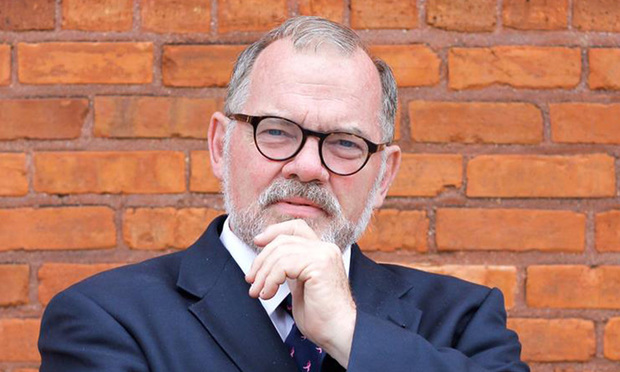Quick Answer: Lawyer Wins Argument Before Filing Response
The decision means that Superior Court Judge Robert "Mack" Crawford of the Griffin Circuit may remain on the job while the JQC processes ethics charges against him involving claims that he improperly took $15,000 from a court registry.
October 26, 2018 at 05:42 PM
3 minute read
 Judge Mack Crawford, Griffin Judicial Circuit (Courtesy photo)
Judge Mack Crawford, Griffin Judicial Circuit (Courtesy photo)
Virgil Brown of Zebulon was still drafting an argument for the Supreme Court of Georgia on Friday when the justices ruled his client's way.
The court unanimously rejected a request by the Judicial Qualifications Commission to suspend Superior Court Judge Robert “Mack” Crawford of the Griffin Circuit, who is fighting charges brought by the ethics panel.
The decision means that Crawford, who is represented by Brown and former Gov. Roy Barnes, may remain on the job while the JQC processes ethics charges against him involving claims that he improperly took $15,000 from a court registry. The Georgia Bureau of Investigation also is looking into the matter.
Brown said he was working on a response to the JQC's request that the Supreme Court suspend Crawford when he learned about the high court's decision on Friday. “I had about eight to 10 reasons why they shouldn't” suspend him, he said.
In asking for Crawford's suspension, the JQC on Wednesday said that allowing the judge to continue to preside over cases while he faces both investigations “poses a serious threat of harm to the administration of justice.”
Brown noted that Crawford, at the JQC's request and to avoid a conflict with the state government, had already recused from any criminal cases while he was being investigated.
“If they wanted him to recuse from everything, they should have asked him,” Brown added, though he said Crawford would have likely said no because he had no conflict in any civil matters.
On Friday, the state Supreme Court issued a one-paragraph order stating, “Having carefully considered the documents submitted with the motion” and the standards of the JQC's rules, “the Court hereby denies the motion.”
Ben Easterlin, the JQC director, said, “When you file a motion, you hope to win.”
Asked if the fact that Crawford hasn't been charged criminally could have been a factor in the Supreme Court's refusal to suspend the judge, Easterlin said that thinking would have been “reasonable,” given that “we have a system of presumed innocence” until charges are proven.
At the heart of both the JQC and GBI investigations is a check for nearly $15,676 in unclaimed funds in the Pike County Superior Court registry. That money was placed in the registry by Crawford, who was then in private practice, on behalf of a client in a property tax dispute.
The case was dismissed in 2009, but the funds remained in the registry until last year, when Crawford directed the court clerk in a handwritten note to write him a check for the unclaimed funds.
Crawford's counsel have countered that the registry funds were legal fees that were owed to Crawford for 16 years. Crawford claimed he forgot to collect after his client died, and a second client moved out-of-state long before the case was dismissed.
Crawford's lawyers have also argued that the JQC was unconstitutionally created. That question will be decided by the JQC's own hearing panel and, if its ruling is appealed, the state Supreme Court.
A JQC hearing on the ethics charges could take place in January.
This content has been archived. It is available through our partners, LexisNexis® and Bloomberg Law.
To view this content, please continue to their sites.
Not a Lexis Subscriber?
Subscribe Now
Not a Bloomberg Law Subscriber?
Subscribe Now
NOT FOR REPRINT
© 2025 ALM Global, LLC, All Rights Reserved. Request academic re-use from www.copyright.com. All other uses, submit a request to [email protected]. For more information visit Asset & Logo Licensing.
You Might Like
View All

On The Move: Ex-Partner Returns to Lead Nelson Mullins Corporate Group, Burr & Forman Hires University GC as COO
5 minute read
Law Firm Sued for Telemarketing Calls to Customers on Do Not Call Registry

Evidence Explained: Prevailing Attorney Outlines Successful Defense in Inmate Death Case
Trending Stories
- 1LexisNexis Announces Public Availability of Personalized AI Assistant Protégé
- 2Some Thoughts on What It Takes to Connect With Millennial Jurors
- 3Artificial Wisdom or Automated Folly? Practical Considerations for Arbitration Practitioners to Address the AI Conundrum
- 4The New Global M&A Kings All Have Something in Common
- 5Big Law Aims to Make DEI Less Divisive in Trump's Second Term
Who Got The Work
J. Brugh Lower of Gibbons has entered an appearance for industrial equipment supplier Devco Corporation in a pending trademark infringement lawsuit. The suit, accusing the defendant of selling knock-off Graco products, was filed Dec. 18 in New Jersey District Court by Rivkin Radler on behalf of Graco Inc. and Graco Minnesota. The case, assigned to U.S. District Judge Zahid N. Quraishi, is 3:24-cv-11294, Graco Inc. et al v. Devco Corporation.
Who Got The Work
Rebecca Maller-Stein and Kent A. Yalowitz of Arnold & Porter Kaye Scholer have entered their appearances for Hanaco Venture Capital and its executives, Lior Prosor and David Frankel, in a pending securities lawsuit. The action, filed on Dec. 24 in New York Southern District Court by Zell, Aron & Co. on behalf of Goldeneye Advisors, accuses the defendants of negligently and fraudulently managing the plaintiff's $1 million investment. The case, assigned to U.S. District Judge Vernon S. Broderick, is 1:24-cv-09918, Goldeneye Advisors, LLC v. Hanaco Venture Capital, Ltd. et al.
Who Got The Work
Attorneys from A&O Shearman has stepped in as defense counsel for Toronto-Dominion Bank and other defendants in a pending securities class action. The suit, filed Dec. 11 in New York Southern District Court by Bleichmar Fonti & Auld, accuses the defendants of concealing the bank's 'pervasive' deficiencies in regards to its compliance with the Bank Secrecy Act and the quality of its anti-money laundering controls. The case, assigned to U.S. District Judge Arun Subramanian, is 1:24-cv-09445, Gonzalez v. The Toronto-Dominion Bank et al.
Who Got The Work
Crown Castle International, a Pennsylvania company providing shared communications infrastructure, has turned to Luke D. Wolf of Gordon Rees Scully Mansukhani to fend off a pending breach-of-contract lawsuit. The court action, filed Nov. 25 in Michigan Eastern District Court by Hooper Hathaway PC on behalf of The Town Residences LLC, accuses Crown Castle of failing to transfer approximately $30,000 in utility payments from T-Mobile in breach of a roof-top lease and assignment agreement. The case, assigned to U.S. District Judge Susan K. Declercq, is 2:24-cv-13131, The Town Residences LLC v. T-Mobile US, Inc. et al.
Who Got The Work
Wilfred P. Coronato and Daniel M. Schwartz of McCarter & English have stepped in as defense counsel to Electrolux Home Products Inc. in a pending product liability lawsuit. The court action, filed Nov. 26 in New York Eastern District Court by Poulos Lopiccolo PC and Nagel Rice LLP on behalf of David Stern, alleges that the defendant's refrigerators’ drawers and shelving repeatedly break and fall apart within months after purchase. The case, assigned to U.S. District Judge Joan M. Azrack, is 2:24-cv-08204, Stern v. Electrolux Home Products, Inc.
Featured Firms
Law Offices of Gary Martin Hays & Associates, P.C.
(470) 294-1674
Law Offices of Mark E. Salomone
(857) 444-6468
Smith & Hassler
(713) 739-1250






